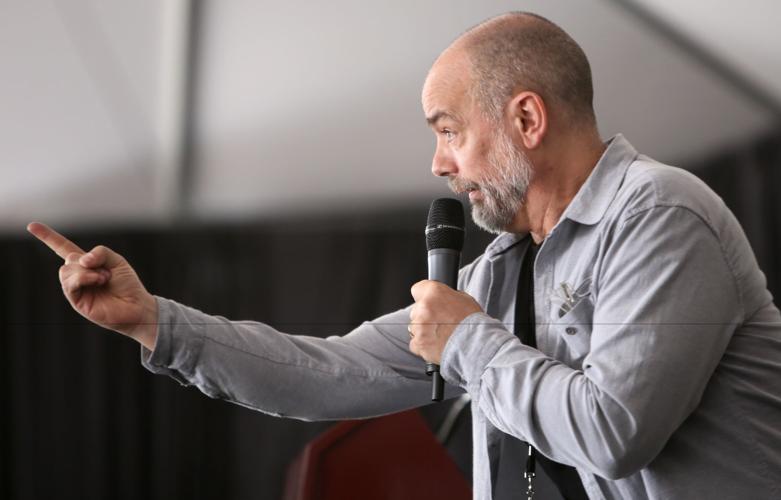“The only thing that can take him out early is Diet Coke,” quipped liberal investigative journalist David Corn.
He was responding to a question Saturday at the Tucson Festival of Books, one that audience members seemed especially keen to ask during a series of panels about current political issues: Will President Trump be forced out of office by any means other than the ballot box?
Corn was only semi-joking when he narrowed the chance to any health issues, exacerbated by diet, the president may have.
“Impeachment won’t succeed in the Senate even if it begins in the House, and indictments take a long time,” said Corn, the Washington bureau chief for Mother Jones magazine and an MSNBC analyst.
Other authors agreed.
“It is highly unlikely Donald Trump will be removed from office before he’s voted out,” said Michael Isikoff, an investigative reporter who has worked for the Washington Post, Newsweek and NBC News, and is co-author with Corn of the 2018 book “Russian Roulette: The Inside Story of Putin’s War on America and the Election of Donald Trump.”
Another key question posed by members of the packed audiences: What will be in the Mueller report and how much of it will the public see?
Greg Miller, a Pulitzer Prize-winning Washington Post reporter who covers national security and the Trump administration, said special counsel Robert Mueller has already shown much of what he has learned in his investigation.
“All of the indictments (issued) are chapters in a very large book, and there are lots of conflicting signals on when and how the final chapter” will be published, said Miller, author of “The Apprentice: Trump, Russia and the Subversion of American Democracy.”
Miller said Deputy Attorney General Rod Rosenstein is “not acting like he wants the public to see it,” but added, “It is not plausible it will be kept from the public forever.”
Isikoff said, “We do think the Mueller report could be delivered any day,” and that expectations have been significantly tamped down in the last six months or so about “any sort of dramatic ‘smoking gun.’”
He said the public will “see something” from the report, but if Mueller is not charging the president with a crime, “it does limit what can be publicly revealed.”
There are hundreds of authors and topics of all stripes (science, mystery, travel, humor, children’s and young adult literature, you name it) at this weekend’s 11th annual book festival on the University of Arizona campus, and readers can avoid politics all they want there.
But the current events panels on the first day were undoubtedly popular, often with every seat filled, and dealt with topics of prime interest to newspaper readers. They carried such titles as “Protecting the Vote,” “Who is Donald Trump?” and “Russia in Our Front Yard.”
As pointed out by Peter Likins, a former University of Arizona president who moderated “Is Democracy in Danger?” the title alone carried a point of view, but he urged that it not be a political rally.
Corn acknowledged the overall audience for such panels at the University of Arizona likely “tilted left,” and it was an audience that embraced liberal applause lines.
Veteran Republican strategist Rick Wilson said he filled a niche in compensating for that.
“I am conservative in every possible axis,” Wilson said Saturday before he appeared with Miller and Corn to talk about the president. “My criticism of Trump is from the right, not the left. My book is a defense of conservative principles” (the New York Times best-seller “Everything Trump Touches Dies”).
A master of one-liners, Wilson indeed skewered Trump throughout the event, which will be televised nationally by C-SPAN Book TV. But he also took on Democrats, saying they “are so good at seeking political death. They will pick the wrong horses and the wrong issues.”
“Maybe not lead with gun control in Nebraska,” he said. “Maybe don’t go with someone who reads like an 80-year-old socialist professor of interpretive dance at Bennington Junior College.” Democrats think they want someone who can “pass the AOC primary, way on the left,” Wilson said, referring, of course, to U.S. Rep. Alexandria Ocasio-Cortez, D-N.Y.
“If it’s grandpa communism versus crazy Donald, I’ll tell you where most of America is going to go, not comfortably, but,” said Wilson, who served as George H.W. Bush’s campaign field director in Florida. And in the absence of a “generational candidate like Barack Obama,” he said, “there’s a very good chance of four more years of Donald Trump.”
A couple of audience members asked about former Trump lawyer Michael Cohen’s statement last week to a congressional committee that if Trump does lose the 2020 vote, he fears there will not be a peaceful transfer of power.
“I don’t know how much credibility to attach to that,” said a skeptical Isikoff. “We still have a functioning democracy. Ultimately I have to believe the rule of law will prevail. ... He’s not going to have an Army to protect him in the Oval Office, so I don’t think we need to worry about that.”
There are many people within the Trump administration itself who are leaking accurate information to reporters, Miller said, either because they are significantly alarmed by certain events or because they were shown the door without their “dignity intact” by a president who “shows no loyalty” and is often “his own worst enemy.”
But Corn warned of other forces he said are interfering with the public’s right to know. During the 2016 presidential election, Obama administration officials were debating whether to fight back against Russian election meddling they were becoming aware of, by perhaps disrupting some Russian information outlets. James Clapper, then national intelligence director, warned that if we fight back in kind, the Russians “might be able to shut down our electric grid,” Corn said.
As to Russian influence, Isikoff and Corn said Cohen, as Trump’s personal lawyer, was negotiating with a Kremlin official for the proposed Trump Tower Moscow project in 2016, even while the candidate said he had no business interests in Russia.
“Donald Trump was dealing with a foreign adversary while he’s campaigning for president, pursuing a project that, according to Mueller, could make him hundreds of millions of dollars,” Corn said.
All politicians lie and embellish, and Bill Clinton was prolific at it, Miller and Wilson said. But the Washington Post’s fact-checking team has documented more than 8,000 times Trump has said something “demonstrably false,” Miller said.
Wilson said Trump’s fans don’t care about this because they say “we love him” or “we’re owning the libs and the liberal media.”
Asked what American citizens can do if they’re distressed by extreme polarization of political opinion, Wilson said people should get involved at the grassroots level “rebuilding human-to-human bonds, building stronger civic and government institutions,” and “rebuilding civic trust.”
At an event across campus, Deborah and James Fallows, longtime writers for The Atlantic magazine, were telling their audience they saw such hope while researching their new book, “Our Towns: A 100,000-Mile Journey into the Heart of America.”
They found a stark contrast between how “embittered, paralyzed and nonfunctioning national politics is, and how creative and innovative local civic life is,” said James Fallows. They visited places where factories or mills have closed, where people are dealing with problems, showing what is possible despite the odds, and adapting to the economy of this era and moving forward, they said.
In towns such as Southern Arizona’s Ajo, which they visited at least three times to show how it is using the arts to revive itself, Deborah Fallows said, there’s this “other America not fully recognized, of people ... crossing any political lines to collaborate.”






